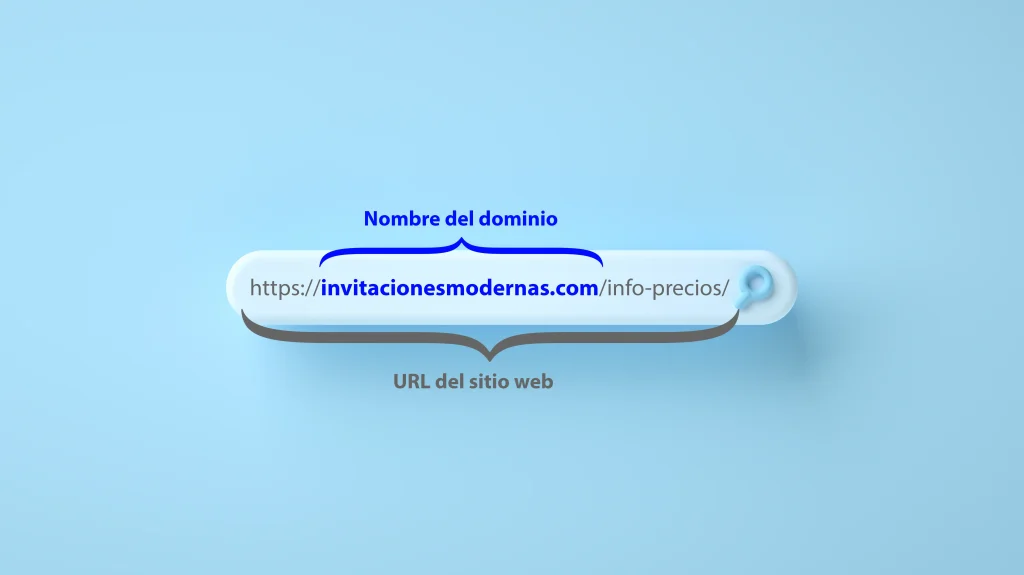In the vast world of technology and the web, it’s crucial to understand the differences between two seemingly similar but fundamentally different concepts: domain and URL. These two key words, “domain” and “URL,” are cornerstones in internet navigation and website management.
A domain is the unique name that identifies an online address, while a URL (Uniform Resource Locator) is a specific address that leads to a resource on that domain. As we explore the difference between domain and URL, we delve into the world of the web.
We’ll discover how these concepts interact to provide us with a coherent and efficient browsing experience. Throughout this exploration, we’ll learn to discern between both terms and understand how to choose a suitable domain for your business.
What is a domain and URL?
A domain is a unique identification on the web, while a URL is a specific address that leads to a resource on that domain. Discover the key differences here in this section.
What is a domain?
A domain is a fundamental component in the structure of internet addresses. It’s a unique identification assigned to a website or online resource. Domains consist of a name and an extension, such as “.com” or “.org,” and act as the main address for accessing a website on the vast network of the internet.
These domain names are easier for users to remember than numerical IP addresses, as they provide a readable and meaningful way to access online resources. Domain registrations are managed through authorized registrars, allowing website owners to maintain control over their web presence.
What is a URL?
What does URL stand for? A URL, or Uniform Resource Locator, is a specific address that points to a resource on the internet. It’s a string of characters that includes the communication protocol (such as “http://” or “https://”), the domain name (such as “www.example.com“), and a path indicating the exact location of the resource on the web server (such as “/page/example.html”).
URLs act as precise addresses for accessing web pages, files, images, or other resources online. They enable browsers and web applications to locate and retrieve information, facilitating efficient navigation and access to content on the web.
Difference between domain and URL
There are many differences between domain and URL. We present you with this comprehensive table of 10 specific differences that will help you understand more about the topic for your company or business.
Difference | Domain | URL |
Definition | It is a unique identification for a website on the internet. | It is a specific address pointing to a resource on a domain. |
Components | It consists of a domain name and an extension (for example, example.com). | It includes the protocol (http:// or https://), the domain name, and the resource path (/page/example.html). |
Purpose | It serves as the main address to access a website. | It indicates the exact location of a resource within a website. |
Examples | google.com, facebook.com. | https://www.google.com/search?q=openai, https://www.facebook.com/login.php. |
Identification | It identifies the website as a whole. | It identifies a specific page or resource on that site. |
Structure | It is a broader and more global entity. | It is more detailed and specific. |
Usage in navigation | It is used to access the website as a whole. | It is used to access individual pages and resources within the site. |
Registration and management | It is registered through authorized registrars. | It is not registered separately; it is part of the address structure. |
Changes | It can change if renewed or transferred to another owner. | It can change if the location or name of the resource on the web server is modified. |
Function | It facilitates the identification and access to a website. | It facilitates precise location and access to resources within a website. |

How to Choose a Suitable Domain
Selecting a suitable domain is crucial for the success of your website. Here are some tips to help you make an informed decision:
- Relevance and coherence: Choose a domain name that is relevant to the content or purpose of your website. It should reflect the identity and focus of your project.
- Easy to remember: Opt for a domain name that is easy for your visitors to remember. Avoid special characters, complex spellings, or very long names.
- Conciseness: Keep the domain as short as possible without sacrificing clarity and relevance. Short names are easier to type and remember.
- Avoid trademarks: Make sure your domain does not infringe on copyrights or trademarks of other companies. Check legal availability before registering it.
- Keywords: If possible, include keywords related to your niche or industry in the domain. This can improve your visibility in search engines.
- Domain extension: Choose a domain extension (such as .com, .net, .org) that is appropriate for your audience and purpose. Although .com is the most common, other extensions may be suitable if relevant to your site.
- Avoid hyphens and numbers: Hyphens and numbers can cause confusion and make memorization difficult.
- Market research: Research your competitors and check if similar domain names are already in use. Try to be unique and stand out.
- Readability and pronunciation: Ensure the domain is easily readable and pronounceable. This is important if you plan to share it verbally.
- Protect your brand: Consider registering various domain variations to prevent others from misusing them.
- Long-term evaluation: Think about how the domain will fit with the evolution of your website in the long term. It should not become obsolete quickly.
- Availability check: Before deciding on a domain, check its availability through domain registrars like Force Domains.
- External opinions: Seek opinions from friends, family, or colleagues to get an external perspective before making a final decision.
Remember that the domain and URL are an essential part of your online identity, so taking the necessary time to choose a suitable one is crucial for the success of your internet presence.
What is a Web Domain For
A web domain serves as a unique, human-readable address used to identify and access a website on the internet. It has several important functions:
- Identification: The domain is the primary identification of your website online. It’s like your home address in the digital world, allowing people to find and visit your site easily and quickly.
- Accessibility: It provides a friendly way for users to access your site instead of having to remember complicated numerical IP addresses.
- Branding: A well-chosen domain can strengthen your website’s brand, helping visitors to associate your domain name with your content, products, or services.
- Credibility: Having your own domain (rather than a free one provided by a hosting service) can increase the credibility and trustworthiness of your website in the eyes of visitors.
- Facilitates navigation: It allows users to access different sections and pages of your site in an organized and coherent manner.
- Professional communication: If you have an email address associated with your domain (e.g., info@yourdomain.com), it can give a more professional impression to your communications.
- Improves SEO: A relevant domain with keywords can positively influence search engine rankings and help make your site more visible online.
- Control and flexibility: Having your own domain gives you total control over your web presence and allows you to customize it according to your needs.

Force Domains: The Best Place to Choose Your Domain and URL
Force Domains has established itself as one of the best places to choose your domain and URL today. With a solid reputation and a wide range of services, this platform offers numerous benefits for those looking to establish a strong and reliable online presence.
One of the highlights of Force Domains is its user-friendly and easy-to-navigate interface, making it easy to search for and register domains. You can explore a wide variety of available domain names and select those that best suit your project, business, or personal brand.
Benefits of Choosing Force Domains
Force Domains offers competitive prices and transparency in fees, meaning you won’t have any unpleasant surprises on your bill. They also provide straightforward renewal options to ensure you always maintain control of your domain.
- Security is a priority at Force Domains, and they offer domain privacy protection to safeguard your personal data from potential online threats.
- Customer support is another strong point. Their support team is available to assist you with any queries or issues, providing you with peace of mind as you manage your domains.
Force Domains combines an easy-to-use interface, competitive pricing, solid security, and excellent customer service, making it an outstanding choice for selecting your domain and URL. Whether you’re starting a new website or managing an existing domain portfolio, Force Domains can be your trusted ally in the digital world.

Final Conclusion
In summary, a domain is a unique identification on the internet, while a URL is a specific address that points to a resource on that domain. Choosing a suitable domain is essential for online success and should be relevant, easy to remember, and avoid legal infringements.
Force Domains is an excellent choice for selecting a domain and URL, offering competitive prices, security, and solid customer service. Start building your online presence with Force Domains and stand out in the digital world!
Explore Force Domains today and choose the perfect domain for your project, business, or personal brand. Take the first step towards a strong and reliable presence!

